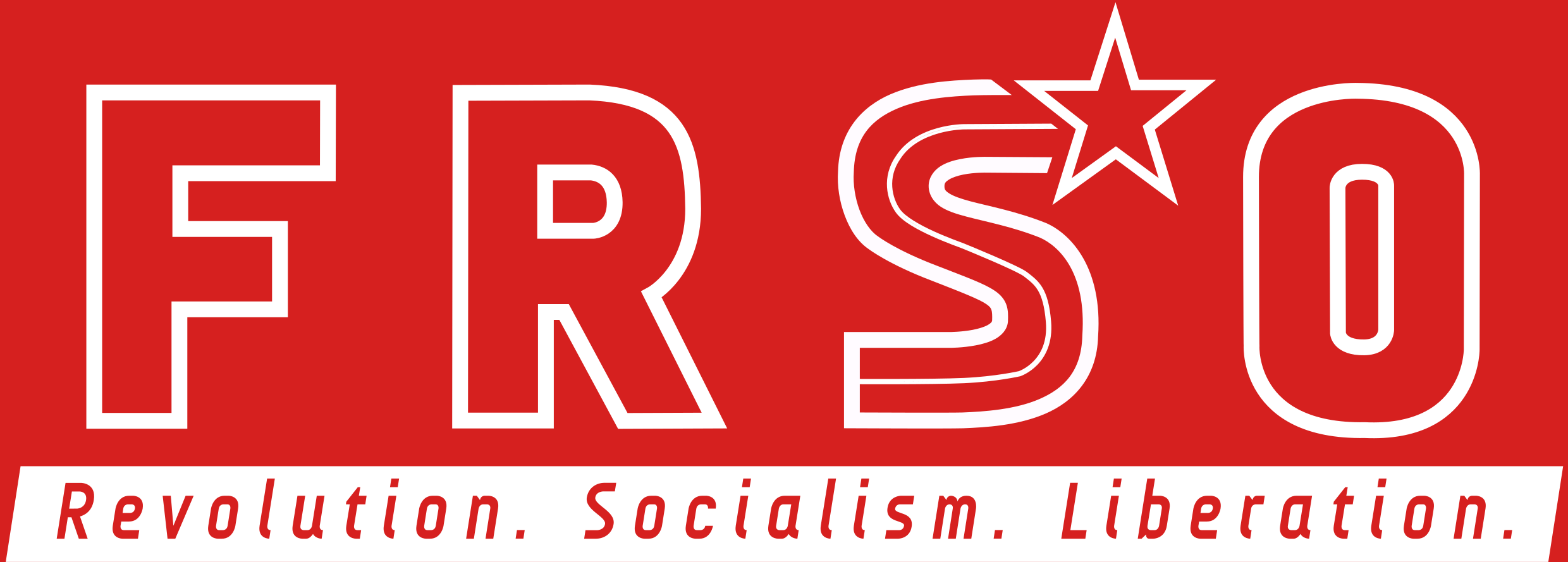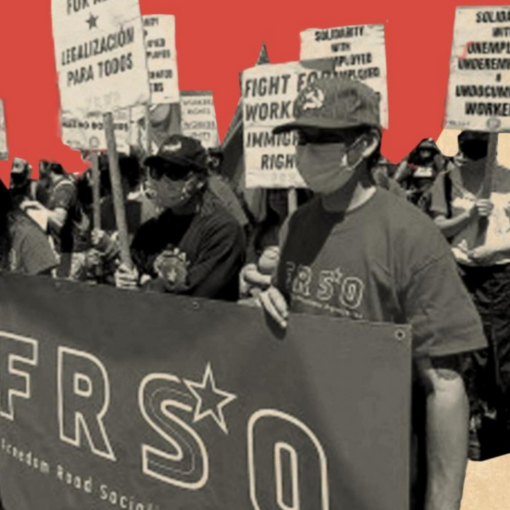Adopted in 2004 by the Fourth Congress of FRSO
I. Introduction
The struggle against national oppression and for full equality in the United States is part and parcel of the worldwide revolutionary struggle against imperialism
The struggle of oppressed nationalities for genuine equality in the United States is not a struggle of “minorities,” rather, it is part of the revolutionary struggle of the majority of the world’s people in the Third World to liberate themselves from imperialism. The U.S. national movements’ identification with national liberation in the Third World can be seen in the solidarity of Asian Americans with the Vietnamese during the Vietnam War, the African Liberation Solidarity and anti-apartheid movements among African Americans, support for Cuba and other liberation movements in Latin America, especially Mexico, among Latinos and of course support for the Palestinian struggle by Palestinians and other Arabs in the United States.
The struggle against national oppression is a struggle against imperialism because it was imperialism* that conquered the Native Americans, Native Hawai’ians and Alaskan Natives, committed genocide against the indigenous peoples and seized their land. It was imperialism that brought Africans, Mexicans and Asians to work as slaves, braceros and contract laborers. It is imperialism that still dominates the countries of the Third World, forcing more immigrants to come to the United States to escape poverty and repression.
The struggle against imperialism and national oppression is a revolutionary struggle, for just as the people of Asia, Africa and Latin America require revolutionary struggles to overthrow colonialism and liberate their countries, so will it take a revolutionary struggle in the United States to gain full equality for oppressed nationalities. Since it is the system of imperialism that profits from and causes national oppression, only the overthrow of this system can end national oppression.
Just as the revolutionary nature of the struggles of oppressed nations and people around the world do not depend on working-class leadership of those struggles, neither does the objectively revolutionary nature of the national movements in the United States require of these movements either working class leadership or a socialist orientation. Since monopoly capitalism is built on both national oppression and the exploitation of the working class, victories in the struggle against national oppression are blows against the imperialist system.
*Note: Imperialism is used here to include both monopoly capitalism and also the imperialist and colonialist policies of Europe and the United States during their pre-monopoly times. The history of the United States is one of continuous aggression and oppression of oppressed nationalities in the United States. For example, even the time of the reconstruction (1865-1877), which brought some gains for African Americans, was a time of continued conquest of Native Americans, the intensification of the anti-Chinese movement and the seizure of Mexican land.
II. Statement on the National Question
1) Support the struggle for independence of Puerto Rico and other colonies of the United States;
Assist and support the struggle for sovereignty and national development of Native Americans, Native Hawai’ians and other indigenous peoples in the United States;
Fight for full equality of oppressed nationalities, including the right to self-determination for the African American, Chicano and Hawai’ian Nations
U.S. imperialism still rules Puerto Rico, the Virgin Islands, Guam and American Samoa as colonies of the U.S. They have no political representation in the United States and their countries are used and exploited by U.S. multinational corporations and the U.S. military. Their struggles are basically struggles for independence from the United States. The fight against imperialism and for socialism in the United States must include support for the independence of these colonies.
The United States has conquered the indigenous peoples of North America, Hawai’i and Alaska. U.S. imperialism has taken their lands, suppressed their culture and carried out genocidal policies. Native American, Native Hawai’ian and Alaskan Natives struggles for sovereignty and national development (including control of land, natural resources and political autonomy) must receive the full assistance and support of those fighting for equality and socialism.
U.S. imperialism brought peoples from Africa, Asia and Latin America to the United States. They have worked as slave and semi-slave labor, their lands and homes stolen, their communities terrorized and their culture degraded. The oppressed nationalities of the United States, including African Americans, Chicanos and other Latinos, Asian Americans, Arab Americans, urbanized Native Americans and Pacific Islanders in the continental United States, are fighting national oppression and for full equality economically, politically and socially.
The fight against national oppression and for full equality must include the right to self-determination, up to and including independence from the United States for the oppressed nations. African Americans in the South, Chicanos in the Southwest, and the peoples of Hawai’i have been forged through national oppression and brutal exploitation into distinct nations, each with a common history, language, territory, economy and culture. National oppression is at the heart of U.S. economic, political and ideological traditions and has been central to the U.S. class struggle. In this country, national oppression takes a specific form: more than simply the domination of several nations and nationalities by an oppressor nation, in the U.S. it entails the subjugation of all oppressed nations by the oppressor nation headed by the white imperialist bourgeoisie.
National oppression in the U.S. is white supremacist national oppression. This white supremacist system propagates ideas of European superiority and other racist ideologies and allows the white population of the U.S. to hold relative material advantage over the oppressed nationalities. Socialists and revolutionaries in the United States must uphold the right to self-determination, in order to build a strategic alliance between the working class and the movements of the oppressed nationalities to overthrow imperialism and establish socialism. The demands of the oppressed nationalities must become the demands of the entire proletariat and be placed at the center of our own class strategy. The main obstacle to building such a strategic alliance is white chauvinism, which must be overcome for the victory of socialist revolution.
2) Only socialism can liberate the masses of oppressed nationalities in the United States
The masses of people of the oppressed nationalities in the United States are workers, who suffer from capitalist exploitation. Capitalism offers no hope for oppressed nationality workers: national liberation without socialist revolution would only mean that oppressed nationality workers would be exploited by capitalists of their “own” nationality. Today one can see that those oppressed nationality workers who work for “own” nationality capitalists, such as garment manufacturers and farm labor contractors, are often among the worst exploited of all workers.
Further, the example of Japan shows that when a non-European country is successful in independent capitalist development, this will only lead to another imperialist power that seeks to exploit and dominate other nations. We don’t want to free ourselves from U.S. imperialism only to become imperialists ourselves.
Only socialism, which ends capitalist exploitation and brutal racism, and which endorses the liberation and equality of all nations, can improve the lives of the masses of people of the oppressed nationalities, and end all forms of national oppression. However, we recognize that the victory of the socialist revolution does not ensure an end to racism and white supremacy, and that the struggle for full equality for oppressed nationalities will be an ongoing part of building socialism.
3) Only the working class can give revolutionary leadership to the national movements
The struggle of oppressed nationalities in the United States against national oppression and for full equality objectively is a united front of many different classes. The main classes are the working class, the semi-proletariat, the petty-bourgeoisie and the national bourgeoisie. All of these classes suffer from national oppression economically (as seen in higher unemployment, lower wages, poor housing, lack of health insurance, fewer businesses, less farms, fewer professionals, poorer schools, etc.), politically (for example, denial of political power, denial of voting rights, police brutality) and socially (stereotyping, degradation of culture, etc.).
However, only the working class can lead this united front in a revolutionary direction towards the overthrow of imperialism. The working class, especially the lower and middle strata, has the least interest in the system of imperialism, and the most to gain from revolution. The working class seeks the widest possible mass involvement in the national movements, promoting democracy and empowerment of the masses.
The working class must popularize the slogan of self-determination for oppressed nations within the national movements. This demand, as opposed to other specific demands, requires a struggle for power and is aimed directly at the monopoly capitalist controlled government, and gives the national movements a consciously revolutionary direction.
On the other hand, the petty-bourgeoisie and the national bourgeoisie also strive to lead the national movements, but often in reformist and narrow nationalist directions. Reformism can be seen in reliance on electoral campaigns and social service agencies. Narrow nationalism can be seen in efforts by some oppressed nationality politicians to establish an ethnic voting block in opposition to other oppressed nationalities, efforts to develop an ethnic market, etc. The petty- bourgeoisie and national bourgeoisie often limit the participation of the working class and the poor, to empower college-educated, middle-class leaders to decide for the community.
This struggle for leadership of the national movements is thus a class struggle. In this struggle the working class must master the science of socialism, or Marxism-Leninism in this current period of imperialism, in order to learn from other struggles to lead national movements against imperialism. Revolutionaries from the national movements have found the lessons of the Chinese Revolution, in the writings of Mao Zedong and other Chinese Communists, to be particularly useful in understanding such concepts as the united front, the mass line and the leading role of the party in making revolution.
4) Building a strategic alliance of the national movements and the working class to overthrow imperialism and establish socialism
“Who are our friends? Who are our enemies?” This is one of the most important questions raised by Mao Zedong in the course of the Chinese Revolution. The national movements in the United States must seek allies in the struggle to overthrow imperialism, establish socialism and end national oppression. The strategic ally of the national movements in the United States is the working class.
The vast majority of workers are exploited by the same monopoly capitalist class that profits from national oppression. They have no fundamental interest in racism and national oppression, and share the same need for socialism as the national movements. This is the objective basis for the strategic alliance. However, we recognize that the socialist revolution does not insure an end to racism and white supremacy, and that the struggle for full equality will be an ongoing process in building socialism.
At the same time, the working class is divided into lower, middle and upper strata. There is a small but influential labor aristocracy, who are recruited by imperialism from the upper stratum of the working class and from among the trade union leadership, who actively work to channel the working class struggle into support for the monopoly capitalist class, for example, the efforts of some trade union leaders who support the “war on terrorism.”
But most importantly, there is a material division between white workers and oppressed nationality workers. White workers are generally better off and much more likely to be in the upper stratum of the working class, with more job security, better working conditions, benefits, etc. They are often college educated, have more opportunities to advance to supervisory and managerial positions and have friends and relatives in the petty-bourgeoisie. And of course, they do not face the national oppression that oppressed nationality workers do – they are not routinely stopped by police, denied homes or jobs, have disproportionate incarceration rates, etc. because of their race. This material division is the basis for racism among white workers, which is the main obstacle to uniting the working class and building the strategic alliance.
The only way that the working class can be united is by the conscious effort of revolutionaries to win the working class to support the national movements’ struggle for full equality, including the right to self-determination up to and including independence of the African American, Chicano and Hawai’ian nations. Revolutionary white workers have a special responsibility to be politically conscious of the effects of national oppression, to struggle with white chauvinism and win white workers to support the struggles of the national movements. It is not enough for white workers to reject and oppose bigotry and racist violence; they must be won to support the struggle for full equality, which includes the right to self-determination by oppressed nations. Concretely this means renouncing the genocide of indigenous peoples, racist restrictions on immigration and immigrants, the annexation of the Southwest and Hawai’i, renouncing slavery and supporting Black reparations.
Uniting the working class to support the national movements is one of the two tasks in building the strategic alliance. The other task is for oppressed nationality workers to struggle for leadership of the national movements and win the national movements to the goal of socialist revolution. Only if the national movements are under the leadership of the working class can they avoid the pitfalls of reformism and narrow nationalism, which are also obstacles to the strategic alliance.
5) A single, unified, multinational communist party is needed to build the strategic alliance
In order to carry out these two tasks in building the strategic alliance, there is a need for single, unified communist party with deep roots among workers and in the national movements.
The strategic alliance of the multi-national working class and the national movements is at the core of our work to build a united front against monopoly capitalism – it is not a strategy for building a communist party. In the great upsurge of the national movements of the 1960’s and 70’s, many communist organizations were created, largely based in a single nationality. As those organizations developed their understanding of Marxism-Leninism, they worked for the construction of a multi-national communist party. Their collective experience demonstrated that limiting their membership to a single nationality restricted their ability to provide leadership to the movement as a whole and limited their ability to struggle against white chauvinism and opportunism.
The future is unwritten. It is entirely possible that new upsurges of struggle may once again give rise to nationality-specific organizations of Marxist-Leninists (or to communist organizations based among specific sectors of the people or in a single geographic area). Given the low level of the development of the communist movement in the U.S., this would be a good thing and we would work to build principled, ideological, political and practical unity on the foundations of Marxism – with the goal of strengthening our work to build a new communist party.
Our enemies have wealth and power, and they are organized. We need a communist party to successfully confront them and to destroy the system of monopoly capitalism. The building of a multi-national communist organization is not a guarantee that no mistakes will be made in fighting national oppression and building the national movements. If there is a failure to build a multi-national communist party, we can be sure that the working class and oppressed nationalities within the prison house called the U.S. will not be able to shatter the chains of oppression and exploitation.
The national movements have been and will be a powerful force for progress in the United States. The fight against national oppression is a fight for full equality, self-determination, real democracy and, in the final analysis, the liberation from imperialism.
In our work to challenge national oppression and to build the unity of the working class, we are working to build the strategic alliance, which is at the center of the united front against imperialism. By our efforts to win the advanced in those and other struggles to Marxism, we are contributing to the effort to build a party that is capable of leading the masses of people in abolishing capitalism and reorganizing for a society that serves the needs of working and oppressed people – socialism.



